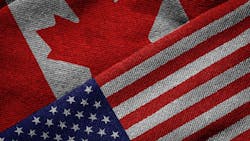President Trump has already met with Canadian Prime Minister Justin Trudeau and Mexican President Enrique Pena Nieto about his plans to re-negotiate NAFTA, which he often called “the worst trade deal in the history of this country” on the campaign trail.
As reported following their meeting, Trudeau reminded the president that Canada is the top buyer of U.S. goods overall and the top buyer for 35 individual states. In fact, more than $373 billion of goods were exported from the United States into Canada last year, with more than $325 billion of goods imported in return from our northern neighbor. Trudeau has also assured Trump that Canada won’t be one of the 1,000 problems he’ll deal with daily.
While it may be true that Mexico is the primary target for renegotiations, any changes in NAFTA will likely have consequences on the United States’ relationship with Canada. Whether the changes are big or small is to be determined, but the fact is NAFTA will change in the near future.
Working as a logistics provider specializing in shipments, customs and deliveries between the United States and Canada, I see on a daily basis the many positive economic benefits that a balanced US/Canadian trade market has brought to manufacturing and retail interests in both countries.
For all the slings and arrows directed at it, NAFTA has contributed significantly to businesses in both the United States and Canada. They are producing; people in both countries are working, and spending money that fuels the local economy.
NAFTA is helping both countries remain globally competitive, which is especially important right now when American and Canadian commerce is being threatened by the manufacturing base in China.
Trump’s assertions that NAFTA is causing America to lose jobs have been countered by many. The Center for Automotive Research, a respected automotive research firm in Ann Arbor, Mich., said in a statement that pulling out of NAFTA could cost auto jobs created since the end of the Great Recession. "Counter to the incoming Trump administration's goal of creating manufacturing jobs, the withdrawal from NAFTA or the implementation of punitive tariffs could result in the loss of 31,000 U.S. jobs," CAR said.
In response to the large border tax Trump is contemplating, Hoyt Bleakley, an associate professor of economics at the University of Michigan, recently said, "A sudden increase in trade costs is a recipe for a slowdown, maybe a recession, as the higher costs disrupt the supply chain."
There are many reasons that the U.S. and Canada make good trading partners. Certainly, that begins with proximity – more than 75% of Canadians live within 100 miles of the United States border. As such, we have similar cultures and consumer interests, and for the most part, speak the same language.
More significantly, businesses on both sides of the border have developed programs and protocols to ease – and in some cases even eliminate – duty obligations. This flow is critical to feed the supply chain for manufacturers and to help them compete cost-wise with overseas entities.
A simple and seamless cross-border logistics process is also essential to retailers -- whether they are shipping their product to brick and mortar outlets or direct to consumers’ homes. And as ecommerce continues to grow, retailers need a way to sell to international customers in order to compete.
Hopefully, the progress the United States and Canada have made over the last two decades – as trading partners and as neighbors – will not be eroded.
Both countries have a shared interest in protecting manufacturing, retaining jobs in North America and strengthening our economic competitiveness in the global marketplace. This is something that is currently protected by NAFTA, and despite any changes to the trade agreement, should be fostered to remain strong.
John Costanzo is president of Purolator International. Purolator International is a subsidiary of Purolator Inc., Canada’s leading integrated freight, package, and logistics solutions provider. Purolator International specializes in the air and surface forwarding of Express, Freight and Parcel shipments, customs brokerage, and fulfillment and delivery services to, from and within North America.
